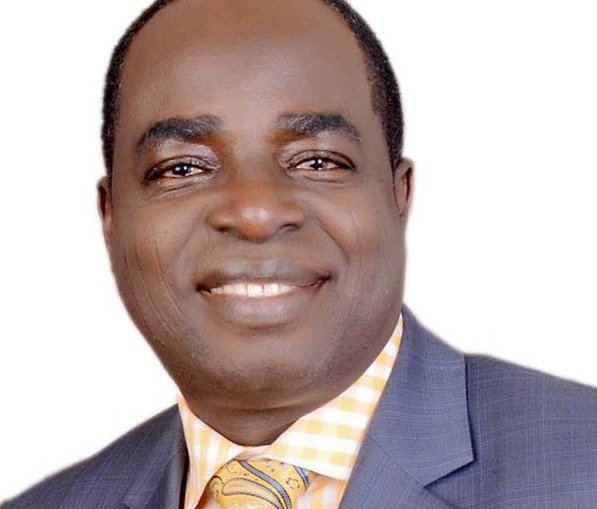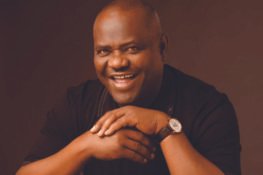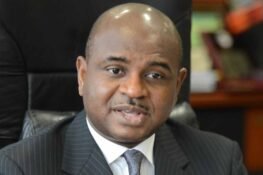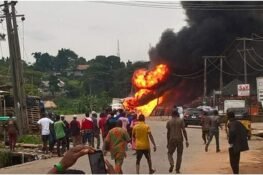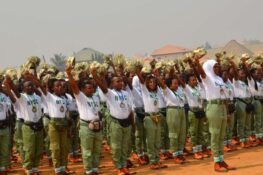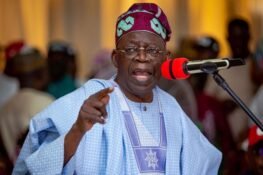Hon Kayode Oladele worked with the Economic and Financial Crimes Commission (EFCC) before venturing onto the political turf and becoming a member of the House of Representatives for Imeko Afon/Yewa North federal constituency, Ogun State. Now chairman, House Committee on EFCC, he speaks with in-depth knowledge and authority on the anti-graft agency’s mandate and how it is discharging it.
Among other insights, Oladele insists that the anti-corruption war is everybody’s war, not just the EFCC’s, and that the extent the agency can go depends on support from the presidency.
As a former chief of staff with the Economic and Financial Crimes Commission (EFCC) and now chairman of the House Committee on Financial Crimes, how would you rate the current activities of the EFCC?
Before I answer that question, please permit me to say that the political will and commitment to fight corruption on the part of an incumbent president is very important in assessing the activities of the EFCC. No matter the avalanche of legal framework and institutional capacity, without the necessary political commitment as a pre-condition, the EFCC will be hampered in its work. What was lacking in the Jonathan administration was the political will and what we are witnessing under the Buhari administration is that strong political leadership committed to fighting corruption at all levels. Lack of political commitment is often characterized by resistance to, and obstructions of, the anti-corruption process.
Are you suggesting that your boss at the time, Mr. Ibrahim Lamorde, yielded to political pressure?
That is not the case; rather I would say that Lamorde didn’t receive enough cooperation and support as well as adequate funding which are very vital in the fight against corruption. There is a difference between yielding to political pressure and not receiving the much needed cooperation, financial support and commitment from the executive.
What about best practices?
That is an internal operating procedure of the EFCC which is a lot different from political will, and I can tell you that from its inception, the Commission has consistently had very commendable best practices in the fight against corruption which seek to identify and eliminate all causes of corruption in all sectors, both public and private. It also emphasizes public sensitization, advocacy and coalition building with the civil society organizations, media and sectoral collaborations with government ministries, departments and agencies (MDAs) towards building a preventive consensus and strategy against corruption. The Commission’s standards remain high and there is no room for officers whose integrity quotient is suspect. Under the chairmanship of Lamorde for instance, the Commission created a dedicated department of internal affairs responsible for keeping constant surveillance on staff to root out tainted officers, and I understand that the current acting chairman, Mr Ibrahim Magu, has further strengthened the internal affairs department.
Considering the presence of political will and the long-standing best practices adopted by the EFCC, what is the score card now?
Flowing from my previous interventions, I can say without mincing words that, increasingly, accountability is gaining centre stage in our governance system as senior government officials, including senior officers of the armed forces and the judiciary, not just the politically exposed persons (PEP) are now being called upon to give account of public resources under their watch and many who are found wanting are today facing criminal trials. The same goes for the private sector: lawyers and several CEOs are under investigation and assets worth billions of Naira are being forfeited by the day. Coming from an often perceived acute corruption environment, it is easy to conclude that not much progress has been made, but that, certainly, is not the case. The facts speak for themselves. Some of the worst corruption cases in the history of the country are now being exposed and culprits made to face justice. Since looking back is planning forward, you only need to look back at our situation just about a decade ago to appreciate where we are today. And definitely this is also largely because there is a clear demonstration of political will to fight corruption, what the Americans call the emergence of a “new Sherriff (Buhari) in town”.
So can we say that the public perception is changing?
Without doubt, yes. Understandably, at some point in the fight against corruption, the public became sceptical about virtually everything, including the work of the EFCC. Nevertheless, it is my opinion that the EFCC is committed and working very hard to achieve its mandate. It is doing its best to make a difference and change things within the ambit of the law while also upholding the rule of law. While tougher and stringent methods are desirable to address what has become a national malaise, the rule of law alone must be the guiding principle. Only then can it be sustained for positive public perception.
Despite this, do you think there are still challenges in the fight against corruption?
We are faced with even more challenges now than before. There is a maxim that says that if you fight corruption, corruption will fight back. This is a truism considering the enormity of the challenges facing the EFCC today. Fighting corruption and other economic and financial crimes effectively perhaps remains the most daunting, if not the most difficult, task in Nigeria. At every turn in the fight, there are monumental challenges. Every case has a peculiar challenge. Either the cases are politicized to frustrate further investigation, or suspects and their supporters drum up ethnic or tribal sentiments to becloud the facts; or yet, in other cases, those associated with the suspect directly or indirectly seek to interfere; or defence counsel frustrates the trials through a myriad of absurd applications and false pleading; or that few unscrupulous judicial officers ensure that the cases never get to trial or the most ridiculous judgement or rulings are handed down to frustrate the Commission. This was the case under the former chairmen, from Nuhu Ribadu to Ibrahim Lamorde and it is still a challenge today more than any other time. Under these circumstances, it is therefore a feat for the Commission to have kept the faith and continued steadily and slowly in combating corruption and instilling the virtue of accountability and transparency in our governance system.
You said in an interview in May this year that the EFCC had recovered $3.1billion, but you did not give any details. What are the details?
That was way back but what I said though was the cumulative sum total of the recovered loots, both in cash and other forms of assets, including real estates. I’m not sure it is necessary at this juncture to give the details as much more has been recovered afterwards. However, because a lot of people have been asking similar question, what my Committee has decided to do is to invite the acting chairman of the EFCC and his team to a public hearing before the end of the year to give a zone-by-zone account of the recovered loot. This way, we can have a more detailed and up-to-date analysis of the recoveries.
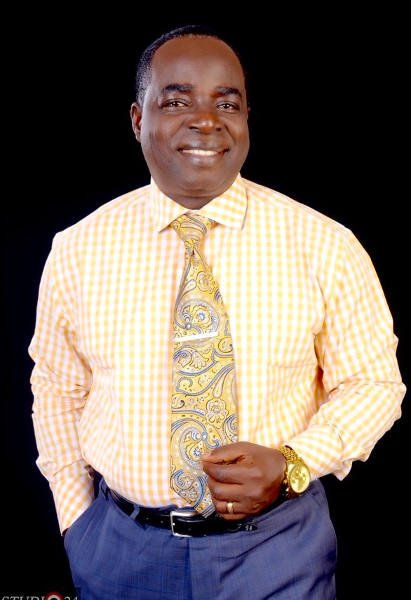 Given the huge sums the government has claimed that it is recovering, why do we need to borrow?
Given the huge sums the government has claimed that it is recovering, why do we need to borrow?
Let me quickly say this, government cannot finance its deficit budget through the EFCC recoveries alone because most of the recovered assets are held under interim forfeiture orders and that cannot be converted to use immediately until the orders become final. The EFCC maintains a recovery account with the Central Bank of Nigeria where looted funds are kept pending the final disposition of cases and who gets what after the disposition of cases depends on who the victims or beneficial owners are. For instance, if the federal government is the beneficial owner, the recovered money will be paid into the federation account but if it is a state government, such assets after final order of forfeiture will go to that state government – just as it happened in the late Alamieyeseigha’s case when the EFCC handed over the recovered properties to the Bayelsa State government. The implication of this is that even though the EFCC has recovered a lot of looted funds and assets from suspects, a lot of them are still being held under interim forfeiture orders. The EFCC cannot dispose of such assets until the interim forfeiture orders become final. Asides, it is my opinion that no amount of recoveries can offset public expenditure going by today’s huge budget deficit, the price of crude in the international market and the low level of production of crude oil due to the activities of militants in the Niger Delta, thereby necessitating the need for an external loan to finance the deficit.
Do you agree that the country is in recession?
Yes, even though some call it technical recession. To me, this is beyond technical. Recession is recession, no matter what name you give to it and the signs are everywhere for all to see.
Do you know the proximate causes?
Absolutely. Where we are today economically is the destination of a journey the country embarked upon several years ago when we chose to adopt a monolithic economy. Even during the oil boom when the slogan was “Nigeria has money but the problem is how to spend the money”, we failed woefully to diversify our economy. At some point also when we had an excess crude account, we failed to utilize the profits for growth and industrial development. It is always desirable to have a fall-back plan, but we failed to diversify our economy in case of times like this. Instead, we ignored the solid minerals’ sector, jettisoned industrial development, oil and gas business became the order of the day, thereby tying our economic destiny to the destiny of oil with its ever dynamic and unpredictable nature in the international market. In addition, the Jonathan administration was very reckless and witnessed the most corrupt and economically inept era in the annals of our political economy. We should have known that, with all of this, recession was just a matter of time and here we are.
Do we have any hope in sight for economic recovery?
As a student of political economy, I can tell you that recession is as old as the concept of modern state, but how every nation responds to it or gets out of it depends very largely on several factors, including the scope and nature of the recession, government’s plans for economic recovery and reforms to avoid a repeat occurrence. If we are to avoid the mistake of the past, it is necessary to have an overview of what was done in the past by other nations to ameliorate and counter it. For instance, the first major economic depression ever recorded in history took place around early 1930’s and it affected the whole world with devastating effects on both the rich and the poor. Even though the depression originated from the United States, the US suffered yet a recession, or call it a depression within the great depression between 1937 and 1938 during the era of President Roosevelt. The recession which was often attributed to tightening of fiscal monetary policy witnessed massive unemployment in the US, manufacturing output fell and there was massive reduction in productivity generally. In response to this, President Roosevelt introduced the concept of three “Rs”, namely, one, “relief to the poor”, two, “recovery” and three, “reform”.
Can you explain the concept of relief, recovery and reform?
Sure. President Roosevelt introduced what was then known as the New Deal which was aimed at fixing the economic recession within the great depression. He introduced a series of relief programs to immediately stop the economic downturns. Considering the fact that during the recession, the people that suffer most are the poor and the unemployed, President Roosevelt gave instant relief in form of cash assistance to the poor and the unemployed in order to cushion the effect of the recession and also provided temporary jobs such as road construction and other menial jobs in order to provide succour to the poor and the unemployed. The next thing he did was to introduce some economic recovery programs such as providing long term jobs, such as building schools and other public works projects that would give permanent jobs to the unemployed and restart the flow of demand and so on. Then he introduced reforms which were programs aimed at avoiding yet another depression in future. It was through Roosevelt’s reforms as a response to the 1937-38 recession that agencies such as Securities and Exchange Commission (SEC), Federal deposit Insurance Corporation (FDIC), Social Security Administration and the National Labor Relations Board were established in the US. all in a bid to insure Americans against any such economic recession in future. President Obama did similar things as part of his administration’s responses to the great recession between 2007 and 2010. One good thing about recession though, is that it doesn’t last long but it requires government’s prompt actions to insulate the poor, the unemployed and embark on actions plans to prevent a reoccurrence. In Nigeria, I think we should immediately embark on economic diversification as a long term and permanent solution because ours was caused principally by the monolithic nature of our economy as I said earlier.
Do you think the President can make the reforms without the participation of the National assembly?
Absolutely no. majority of the responses to recession requires the passage of enabling legislation thus requiring a synergy between the executive and the legislature. Some laws would need to be repealed while new ones would emerge in order for the required socio-economic change to take place.
Abdumumunin Jubril has accused the leadership of the House of Representatives of padding the budget and compromising members to keep silent. Is it true?
Not to my knowledge and nobody has compromised me to keep silent.
Was the House right to suspend Jubril and in the process deny his constituents the fundamental right of representation for one year?
Hon Jubrin has gone to Court to challenge his suspension; hence, it will be subjudice to comment on it at this time. Maybe we should wait for the outcome of his lawsuit. Nonetheless, I should mention here that the House has power to suspend any erring member without violating the rights of such member’s constituents to representation. It is the parliamentary rule and procedure worldwide. This does not however prevent a suspended member from seeking a judicial review but that in itself does not defeat the power of the parliament.
Why haven’t you spoken up?
Against what? If it is Jubrin’s matter, then it is subjudice. Besides, as the Chairman of the House committee on Financial Crimes with oversight powers over the activities of the EFCC, I’m not sure it would serve the interest of justice if I do that.
But do you think the National Assembly has power to alter a budget proposal as presented by the President?
Yes I do.
Why do you think so?
I really don’t know why people think that the NASS’s role in appropriation is simply ceremonial and I feel very sad sometimes when I realize that those who should have known the National Assembly’s power of the purse as expressly stated in the Constitution are the very ones canvassing the theory. Having said this, I believe that the general public need to be educated on the powers of the National Assembly including its limitations because it is obvious that a lot of misinformation is circulating out there. There are three basic functions of the legislature namely, representation, law making and appropriation. Appropriation bill which we popularly referred to as the budget goes through the same procedure like any other bill, that is, the first reading, second reading, committee stage and the third reading. In the case of the appropriation bill, the Constitution makes it very clear that the National Assembly has power and control over public funds. As if that is not enough, Section 80 (4) provides that no moneys shall be withdrawn from the Consolidated Revenue Fund or any other public fund of the Federation, except in the manner prescribed by the National Assembly. This is what is referred to as the power of the purse in some other climes such as the United States.
Can you expatiate on that?
What I’m saying in essence is that when the Constitution states in Section 81 (1) that the President shall cause to be prepared and laid before each House of the National Assembly at any time in each financial year estimates of the revenues and expenditure of the Federation for the next following financial year, the Section in subsection (2) further stipulates that the heads of expenditure contained in the estimates shall be included in a bill, to be known as an Appropriation Bill. As I said earlier on, the budget estimates prepared by the President is an executive bill and as a bill, it will go through all the procedures for making a bill. The National Assembly has the Constitutional power to modify it, amend it or even reject it totally. That is why in places like the US, when the Congress creates a funding gap by rejecting or failing to pass the budget or appropriation bill, the government simply shuts down. It is in a bid to avoid this situation in Nigeria that the Constitution provides in Section 82 that if the Appropriation Bill in respect of any financial year has not been passed into law by the beginning of the financial year, the President may authorise the withdrawal of moneys in the Consolidated Revenue Fund of the Federation for the purpose of meeting expenditure necessary to carry on the services of the Government of the Federation until the coming into operation of the Appropriate Act. I have gone through all this in order to debunk this whole idea that the NASS has no power to increase, decrease or even reject the budget estimates prepared and presented to it by the President. To conclude otherwise is to commit legal heresy.
As a first-term legislator, what specific bills have you advanced and what are you doing for your constituents having been in office for over a year now?
I hope you are also not likening the work of the legislator to that of the executive when you asked what I have done to my constituents. However, the first thing I did when we settled down to business was to look into the legislative agenda of the House to see the provisions therein that would have direct bearing on my constituency. The Legislative Agenda is a huge document and a whole lot of areas will affect my constituency, just like it will affect several other people in Nigeria. Let me start from unemployment because it is part of the agenda, to ensure that we tackle the problem of unemployment in Nigeria. If I’m talking about unemployment in my constituency, it’s a microcosm of what is happening all over Nigeria today. We have many graduates who don’t have jobs; we have a lot of graduates today riding commercial motor bikes (okada), doing all sorts of menial jobs to make both ends meet. Therefore, the issue of unemployment, both at the graduate and undergraduate levels, even those that didn’t go to school, is of paramount concern to me and, by extension, my constituents. I have been doing a lot to ameliorate this problem by assisting the youths in my constituency to find government jobs but, as usual, the economic recession has not made that very easy to accomplish as many government ministries, agencies and departments have no funds to embark on new recruitments.
Of course, talking of security challenges too; people are talking about Boko Haram, the kidnappings, but it’s beyond that. Today we have a lot of unsolved murder cases, assassinations here and there; it’s not political assassinations alone. I am from an international border community, Imeko Afon/Yewa North federal constituency, bordering Republic of Benin and I remember, during my contributions on the floor of the House on the legislative agenda, I noted that there was no mention of the need to develop border communities on the agenda. We discussed the development of the North East because of the ravaging effects of Boko Haram and there are a lot of IDPs today. We discuss the issue of Niger Delta, but all the time when we discuss these issues, not only in the National Assembly but in the country in general, we don’t discuss the very essential issues concerning the neglect of international border communities. We talk of national security but we are not talking of how to secure our international borders. Meanwhile, securing international border areas start from giving the people that live in the border regions a sense of belonging so that they don’t accommodate people that should not be accommodated. So, when you are talking about security and you are not giving the people who live in international border communities that sense of belonging, then we are not doing the right thing. Happily, this has now been reflected in the Legislative Agenda and more funds are being provided for the Border Communities Development Agency (BCDA) to embark on the development of international border communities, including my constituency. In the coming years, I will also work to ensure that the law creating the BCDA is amended to give the agency more access to public funds in order to achieve this objective. On the whole, my constituency is very proud of me for giving them adequate representation and I also appreciate them a lot for giving me the opportunity to serve. I will continue to give them that adequate representation they all desire and envision in times like this.
What about Bills – how many have you sponsored or assisted to pass?
As the chairman of the House Committee on Financial Crimes, I know that for Nigeria to be respected in our fight against corruption, we have to comply with several legal regimes and international best practices. For several years, weak legal framework seemed to be one of the weakest links in Nigeria’s anti-corruption chain. This has led to perennial delay in justice administration, perceived miscarriage of justice, low rate of conviction and a barrage of embarrassing incidents such as convictions abroad of suspects who had been tried and acquitted by our courts with the same evidence. In addition, it has been challenging to ensure the repatriation of billions of Naira in public funds looted by former public office holders from western countries. In the same vein, as a member of Egmont Group of Financial Intelligence and an aspiring member of the Financial Action Task Force (FATF), Nigeria is required to pass certain legislations to deprive money launderers and terrorist organizations of their funds, and take away their ability to corruptibly enrich themselves or finance terrorist attacks which continue to affect our political stability, undermine our economic gain and future development. This is my area of concentration for now. And in order to achieve this objective, I have been working with the House leadership and my colleagues in the Senate as well as the office of the attorney-general of the federation (AGF) so that we can all agree on these bills and make them less contentious. Essentially, these include the Mutual Legal Assistance on Criminal Matters Bill, Proceeds of Crime Bill, the Economic and Financial Crimes Commission Amendment Bill, Whistle Blowers Protection Bill, Terrorism (Prevention and Prohibition) Bill, Money Laundering (Prevention and Prohibition) Bill and so on.
As I stated earlier, my House Committee is working with the Senate Committee on anti-corruption and financial crimes and the executive to ensure the early passage of these Bills. Just recently, I was able to secure financial assistance from the European Union (EU) under the 10th European Development Fund (ETF), the United Nations Office on Drugs and Crime (UNODC) and the United Nations Development Program (UNDP) to organize a four-day retreat in Calabar, the Cross River State capital for members of my committee and selected civil society organization (CSOs) aimed at enriching the contents of some of these Bills. As I said earlier, this is my priority for now even though I’ll soon introduce some private member bills to the House.
Have you collected your Constituency Project Allowance? How much is it?
This question is yet a by-product of misinformation to the public. The truth is, as a legislator, you don’t handle cash for constituency projects. While a legislator can nominate a project in his or her constituency based on the funds allocated to his constituency in the budget which varies from member to member, the execution of such project is the sole responsibility of the executive. For instance, the federal government has not released any funds for constituency intervention projects this year; hence, none of the projects I nominated under the 2016 budget has been done by the executing agency I nominated, which is the Nigerian Building and Roads Research Institute (NBRRI). Even the one that is currently being executed by BRRI in my constituency under the 2015 budget, I don’t know the contractor. I have never seen him but the project, which is progressing very well, is being executed and supervised by NBRRI. So, I have never collected any amount for constituency projects and I will not collect one because it is not the responsibility of a legislator to execute projects. These are within the exclusive preserve of the executive through the executing ministries, departments and agencies.
Not a few Nigerians are of the opinion that the salaries and allowances of lawmakers are on the high side, or humongous. What is your take on this?
I don’t really know where the word ‘humongous’ came from and I think they are over-blowing the whole thing beyond proportion. What we have done in the House is to say that we need to publish the whole thing for people to see. I remember I granted an interview to one of the electronic media some time ago on this same issue and I said people are not asking the right questions. To me, the National Assembly has a lot of challenges and we should not allow the issue of their salaries and allowances overshadow these challenges. So you know, the National Assembly is a very huge institution. Its budget annually, which has even been slashed by one-fifth, is less than two percent of the Nigerian budget and it is from this we take care of both arms of the legislature, the National Assembly staff, the National Institute of Legislative Studies as well as the Public Complaints Commission, etc. So, those who blow the issue out of proportion and make it appear as if the economic problems we have in the country starts and ends with the salaries and allowances of the legislators know too well that they are misleading the public. Generally, the problem is how to block the leakages that bleed the Nigerian economy, and to be able to do that, we have to look at the right direction, like asking questions about the implementation of the budget generally.
With all that is going on with our judicial system, do you still consider the judiciary as a partner in the fight against corruption in Nigeria?
Without doubt, I do. The judiciary and the legal system is one crucial factor in the fight against corruption. It is not just the EFCC that is in charge; the buck stops at the judiciary’s table. This is because the EFCC is only concerned with investigation. The conviction is in the hands of the courts. Even if the EFCC does a thorough investigation and does its work very well in prosecution and a judge still feels that the case has not been proved beyond reasonable doubt, the judge can acquit the accused and set him free. Therefore, for there to be an effective fight against corruption, the judiciary has to be seen as an equal partner. In Nigeria today, I can tell you sadly that we have problems with some judges, not with all judges though. The president has said it – and I agree with him – that the judiciary has to be cleansed because of the infamous activities of some judges and questionable judgments coming from the Bench. Specifically, we have problems with endless adjournments, frivolous motions and incessant interlocutory appeals being granted by the judges all in bids to frustrate cases. The good news is that at the twilight of the last administration, the National Assembly passed a bill that was signed into law by former President Goodluck Jonathan, namely the Administration of the Criminal Justice Act. That Act has overhauled the entire criminal justice system in Nigeria. Speedy trial is now a legal requirement and there is an express bar against interlocutory appeals, particularly in matters involving corruption cases and other sundry matters. Such appeals are now to be reserved until after final judgment. The judiciary is cleansing itself while the National Judicial Council has equally vowed to deal with any judges found guilty of professional misconduct and, of course, we know that some judges are now facing corruption charges in court. With these developments, one is confident that the judiciary will ultimately be a reliable partner in the fight against corruption in Nigeria.
Back to the EFCC, do you think that the Commission should be under the presidency as is presently the case?
The truth is that the EFCC is currently under the presidency and its budget is usually treated as such in the Appropriation Act. This is because the enabling law does give the Commission a first-line charge, unlike the ICPC. There is, therefore, a need for the EFCC Act to be reviewed so that it can come out of that incubator and be more independent. Because the Commission is under the presidency, its activities can be tinkered with by the presidency. So, in order to ensure fairness to all, for people not to have the perception that the president is using it to witch-hunt political opponents, the law has to be amended. I have discussed this with the House leadership and my counterpart in the Senate and I believe we are all in agreement on the need to review the EFCC Act.
Do you think that the EFCC and ICPC should be merged in the light of the current economic situation as has been suggested in certain quarters?
It is not the first time that the issue of the merger is coming up. A committee was set up by the last administration and it came out with a recommendation that they should be merged, but the government white paper disagreed with that proposal. The white paper said they should function separately. I also agree with that position. I remember that the former chairman of the ICPC, Justice Emmanuel Ayoola, was equally of the opinion that the two agencies be allowed to perform their functions independently because no one steps on the functions of the other; they have different mandates, I can tell you that. If you look at the enabling law, you will discover that their mandates are not the same. The EFCC is supposed to handle economic and financial crimes, regardless of whether you are in the private or public sector, while the mandate of the ICPC is to receive and investigate reports of corruption of public officials and enforce the correction of corruption-prone systems and procedures of public bodies, with a view to eliminating corruption in public life. The EFCC handles the issue of money laundering. We also have the Financial Intelligence Unit which is domiciled with the EFCC. So, if you look at the enabling laws, they are different. I had worked with the EFCC before and I can tell you that they never had any clash in their duties. But when you look at the current economic situation, you might be inclined to say, why don’t we merge the two so that we can minimize cost and all that? Beyond that, I don’t think they pose any threat in their duties.
Why is it that no chairman of the EFCC has been reappointed for a second term, starting from the founding chairman, Malam Nuhu Ribadu?
The chairmanship of the EFCC is one of the most unpopular jobs on the face of the earth and the forces against him or her can be aggressive, powerful and usually dirty. When you fight corruption, corruption fights back. It is a daunting task; hence, it would require an act of God for anybody holding that position to secure a second term in office.
What is the future of the fight against corruption in Nigeria?
Well, the fight against corruption should be the collective action of everybody. Like I said in one of my speeches, fighting corruption without the involvement of the people can be likened to trying to control erosion and flooding with a fence of palm fronds; it cannot withstand it. So, it involves the collective action of everybody. We all have to participate. Most times we look at politically exposed persons as the only form of corruption in the society, forgetting the fact that corruption is endemic in our society. For instance, we have petty corruption and institutional corruption as well as cybercrimes. The politically exposed persons evolved from the society, not outside the society. So if you have a corrupt society, it will only produce corrupt leaders. Corruption in Africa has a lot of socio-cultural implications attached to it. We should all fight corruption with one voice. For example, while I was with the EFCC as chief of staff, when James Ibori, former Delta State governor was charged to court on grounds of corruption, the matter was first assigned to a judge in Kaduna. The people from Delta State would hire buses in their hundreds (and travel to) to Kaduna State, wearing pro-Ibori uniforms, and abusing EFCC prosecutors and officials. To them, Ibori was a tin god and his prosecution for corruption amounted only to ethnic persecution. We all have to be involved and speak out against corruption. Except we all see it as an endemic problem in the society, it may be hard to fight. Successive governments should also fight corruption with the same zeal and political will. With this, we can ensure growth and development in Nigeria.
The Financial Action Task Force (FATF) got Nigeria off its black list some years ago; have we made enough progress to avoid regression?
Let me take you down the memory lane a bit. The EFCC was conceived originally as the Commission that would domicile the Nigerian Financial Intelligence Unit (NFIU). That informed the responsibility that was imposed on the EFCC by section 6 of the EFCC Act of 2003. However, because the 2003 Act did not make any provision for the domiciliation of the NFIU, the Act was amended in 2004 with the insertion of a new section 2(c) which states that the EFCC is the “designated Financial Intelligence Unit (FIU) in Nigeria which is charged with the responsibility of co-coordinating the various institutions involved in the fight against money laundering and enforcement of laws dealing with economic and financial crimes in Nigeria”. By housing it within the EFCC, the NFIU combines the unique features of an administrative type and law enforcement type FIU, enabling it to enforce compliance when there is a violation. It is equally significant to note that the FATF was satisfied with the strategic location of the FIU when it came on onsite visit in May 2006. It was on the strength of this and several other complaint requirements that Nigeria was delisted from the Financial Action Task Force (FATF) Non Cooperation Countries and Territories (NCCTs) list. It was also because Nigeria met all the pre-conditions that the NFIU was admitted into the Egmont Group of Financial Intelligence Units in 2007. The Egmont Group Standards and core principles in 2007 when NFIU was admitted and today have not changed. That said, I should also mention here that our membership application with the FATF is still pending.
We are not yet a member of FATF, why is this so?
No. Nigeria is not yet a member of the FATF. South Africa is the only African country that enjoys a full membership status. Nigeria applied to join the global body in 2014 and reapplied again in 2016. I was part of the three-man Nigerian delegation that attended the February 2016 plenary session in Paris, France, where the issue of Nigeria’s membership was discussed. We also attended the October 2016 plenary in Paris, France, where the issue of Nigerian membership also came up for discussion and I was part of the Nigerian delegation as well.
Any progress?
Yes, we have made a substantial progress in our membership process and I want to publicly acknowledge the support given to Nigeria by the Inter-Governmental Action Group against Money Laundering in West Africa (GIABA) in this regard. At the end of the October 2016 plenary, the FATF resolved to send a high-powered delegation to Nigeria in March 2017 to assess our legal regimes against money laundering and counter terrorism financing. FATF is impressed with Nigeria’s political will and commitment to fight corruption.
As an international lawyer and a human rights activist, why did you decide to join politics?
Simple, according to Edmund Burke, the “only thing necessary for the triumph of evil is for good men to do nothing.”
